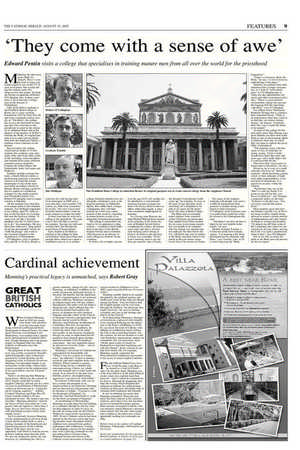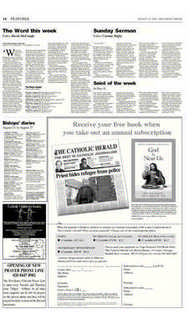Page 9, 19th August 2005
Page 9

Report an error
Noticed an error on this page?If you've noticed an error in this article please click here to report it.
Tags
Share
Related articles
Two Nations United By A Common Tv Culture
Doubts
The Sins We Would Like To Be Repeated
What `culchies' Taught Us About Sex
Doubts
‘They come with a sense of awe’
Edward Pentin visits a college that specialises in training mature men from all over the world for the priesthood Marketing the television series Buffy the Vampire Slayer is not the kind of entry you would expect to see on the CV of your local priest. Nor would selling the cartoon series The Simpsons for that matter. Yet both are former occupations of Robert O’Callaghan who, in three years’ time, is set to become a clergyman in the diocese of Nottingham.
Like all his fellow-students at the Pontifical Beda College in Rome, his is a late vocation. Founded in 1852 by Pope Pius IX and more commonly known simply as “The Beda”, the college has always devoted itself to training men who come late to the priesthood. Located in the clearer air of suburban Rome and in the shadow of the basilica of St Paul’s Outside the Walls, its original purpose was to train convert clergymen from the Anglican Church, a tradition which continues to the present.
But nowadays the college, which had an intake of 15 new students this academic year, also trains older men from other walks of life including widowed fathers and students from many different countries such as Australia, Canada, the United States, the Netherlands, India, Sri Lanka and Malaysia.
Students include a former barrister, a South African soldier, a professional musician, a research chemist at ICI and the former headmaster of one of the most successful secondary schools in Britain. Before earning a good living in London as a marketing manager for the media corporation Twentieth Century Fox, Robert O’Callaghan used to repair watches at Sekonda.
All the students have had their own unique paths to the ordained ministry. Jim Mulligan responded to his calling, aged 50, while sitting on the top deck of a London bus near the Archway bridge. “It came over me like a Joycean epiphany that this is what I must try to do,” he remembers. He says there then followed a “long period of private discernment” before he “took the plunge” and wrote to the vocations director in the Archdiocese of Westminster.
O’Callaghan’s story is particularly special: at 36 he is already a widower, his wife having died from meningitis in 2000, just a year after they were married. “Of course, my faith took a nosedive,” he recalls, “but once I recovered from the bereavement I went on many retreats to re-find my faith.” A short time later he received a calling to the priesthood. “In some ways I feel a bit like a convert,” he explains, “leaving my faith and coming back, but through the actual form of bereavement.” Each student at the Beda is referred to the college by their local bishop. Some have been sent straight there, others have spent a foundation year or so at another college (English students have traditionally completed a year at the English seminary in Valladolid, Spain). But, unlike their younger counterparts, they will then embark on a four-year course instead of the usual six, attending in-house lectures as part of an integrated formation programme.
The college is particularly distinctive for its openness to other cultures – a tradition which harks back to the days of the British Empire but has since continued, often because of an absence of such colleges in students’ home countries.
In Africa, for example, anyone over the age of 25 will usually not be admitted to a conventional seminary because younger students will always defer to them as elders rather than equals, a situation considered inappropriate to learning.
As a young man, Kenyan student Michael Babugichuru trained at his seminary in his home diocese of Malindi but left before completing his studies. Seventeen years later, and after a 10-year stint studying and working in Greece, he believes the decision to leave was a mistake. “Every time I seriously tried to get settled, get married, raise a family, the thought of priesthood would come up,” he explains. So now, at 40 years of age and after much searching, he is delighted to be able to try again for the priesthood, this time at Beda College.
The Beda also occasionally trains students from countries where Christians are persecuted. One student from China studied for six years in his home country but was unable to be ordained after his bishop was arrested and not replaced. He then fled to the US, will finish one year of studies at the Beda, and then return to his parish in Hawaii (house arrest awaits him if he returns to China). For many of the students, studying with people with such a wealth of international backgrounds is another strong contribution to their formation. O’Callaghan, from Leicester, sees it as particularly useful for when he returns to his Nottingham diocese.
“Anything I can pick up here is likely to be very helpful in the future,” he says.
Brother Graham Touchie, a Cistercian monk from Canada, agrees: “I’m learning a lot about priesthood just by studying with them,” says Touchie, who, at 39, is much enjoying the “Beda “There’s a closeness about the Beda,” he says, “a sort of down to earth feeling to the place.” Students are granted more independence than younger seminarians, or a kind of “semi-obedience” as O’Callaghan puts it. There are also opportunities for sports and other recreational activities. “There’s a more relaxed environment, taking into account the baggage that the men bring with them,” says O’Callaghan.
For college rector Monsignor Roderick Strange that is a particularly important factor. “There is an expectation when they come to us that they are mature human beings,” he stresses. “Certainly that’s the way I would like them to be treated.” As head of the college for the past eight years, Mgr Strange says most students see their time at the Beda as one of discernment, albeit a relatively short one, in which they are open to explore the possibility of priesthood.
“The majority come with that sense of awe of what they’re doing, saying, ‘Gosh, I really should have done this years and years ago, and I really didn’t feel it could possibly be me.’” They have that “good sense of being open to formation”, he says.
However, he is wary of a small minority who have an “absolute certainty” about becoming a priest which, to him, indicates a flight from other responsibilities, a certain kind of immaturity, or a search for security within the Church.
“Sometimes they say to me ‘But I’ve sold my home, I’ve given up my job for this, you have to ordain me’” says Strange, a respected author on the faith. “It doesn’t work that way... You can’t buy yourself into priesthood.” Most students agree that leaving behind a secular way of life is no mean sacrifice, despite being allowed to retain a certain amount of independence and such material things as savings and property. “To detach myself from some of life’s trappings and values to concentrate on serving others, serving the Lord, was quite a painful transition at first,” says O’Callaghan.
But so far, like so many students at the Beda past and present, he has no regrets.
blog comments powered by Disqus

















